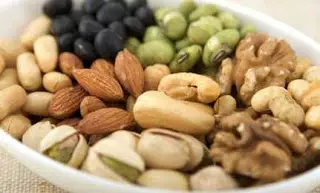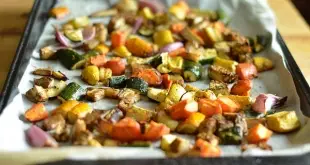BF Basics: Veggie Tales was composed by four-year post-op and 25-year vegetarian, Kelly, better known as Poet Kelly on Obesity Help. This series is written in her voice with the full endorsement of Bariatric Foodie. If you have any questions for Kelly about any of the information provided, please leave them in the comments and she’ll gladly respond.
Sometimes people ask me if it’s possible for post-ops to be vegetarians. Can they get enough protein without eating
meat? Sure they can. Absolutely.
I’ve been a vegetarian since I was 14 years old and was not about to
start eating meat when I had weight loss surgery. I get at least 70 grams of protein daily
without any trouble, usually more, and later on in this series I’ll tell you
how I do it.
meat? Sure they can. Absolutely.
I’ve been a vegetarian since I was 14 years old and was not about to
start eating meat when I had weight loss surgery. I get at least 70 grams of protein daily
without any trouble, usually more, and later on in this series I’ll tell you
how I do it.
Is it hard to get enough protein post-op without eating meat?
Well, I don’t think it’s too hard. Since non-meat foods usually have less
protein per ounce than meat, it does mean I have less room in my pouch for
non-protein foods. For instance, three
ounces of meat has about 21 grams of protein but a half cup of black beans only
has about seven grams of protein. That
makes it even more important for me to focus on protein first.
protein per ounce than meat, it does mean I have less room in my pouch for
non-protein foods. For instance, three
ounces of meat has about 21 grams of protein but a half cup of black beans only
has about seven grams of protein. That
makes it even more important for me to focus on protein first.
Here is a list of foods and how much protein they
contain. You might be surprised to learn
that even broccoli has protein in it!
contain. You might be surprised to learn
that even broccoli has protein in it!
Food….Grams of Protein
Black beans, 1 cup…15
Kidney beans, 1 cup…13
Veggie burger (varies somewhat by brand)…13
Tofu, 4 oz…11
Peanut butter, 2 tbsp…8
Almonds, ¼ cup…8
Soy milk, 1 cup…7
Soy yogurt, 6 oz…6
Spinach, cooked, 1 cup…5
Broccoli, cooked, 1 cup…4
Kidney beans, 1 cup…13
Veggie burger (varies somewhat by brand)…13
Tofu, 4 oz…11
Peanut butter, 2 tbsp…8
Almonds, ¼ cup…8
Soy milk, 1 cup…7
Soy yogurt, 6 oz…6
Spinach, cooked, 1 cup…5
Broccoli, cooked, 1 cup…4
Don’t beans have a lot of carbs…and don’t they give you a lot
of gas?
of gas?
Yep, they do. They
are complex carbs, though, and high in fiber.
But depending on what they’re made of, beans and pasta are digested differently. Vegetarian post-ops will
probably take in more carbs altogether than post-ops that eat meat, though.
are complex carbs, though, and high in fiber.
But depending on what they’re made of, beans and pasta are digested differently. Vegetarian post-ops will
probably take in more carbs altogether than post-ops that eat meat, though.
Beans do give some people a lot of gas, and some post-ops
have uncomfortable gas anyway. I’ll tell
you a secret about how to make less gassy beans, though. If you buy dried beans instead of canned
beans, and soak them in cold water with some baking soda for about four hours,
then drain and rinse the beans, and finally soak them in cold water for another
four hours, they will not make you fart as much. Dried beans are cheaper, too.
have uncomfortable gas anyway. I’ll tell
you a secret about how to make less gassy beans, though. If you buy dried beans instead of canned
beans, and soak them in cold water with some baking soda for about four hours,
then drain and rinse the beans, and finally soak them in cold water for another
four hours, they will not make you fart as much. Dried beans are cheaper, too.
What about the first few weeks post op?
Your surgeon or dietician will probably give you a meal plan
and it will probably include lots of meat, eggs and dairy products. Your surgeon and dietician may or may not be
very familiar with a vegetarian or vegan diet.
Your best bet is to find a dietician that is familiar with both weight
loss surgery and a vegetarian or vegan diet, though it might be hard to do
that, depending on where you live. You
may end up having to educate your doctor or dietician!
and it will probably include lots of meat, eggs and dairy products. Your surgeon and dietician may or may not be
very familiar with a vegetarian or vegan diet.
Your best bet is to find a dietician that is familiar with both weight
loss surgery and a vegetarian or vegan diet, though it might be hard to do
that, depending on where you live. You
may end up having to educate your doctor or dietician!
You can substitute vegetarian or vegan options for the items
on your standard post-op meal plan. Here
are some options:
on your standard post-op meal plan. Here
are some options:
Clear Liquids
- Substitute veggie broth
for chicken broth. You can even add unflavored protein powder to your
broth (if your plan allows it) to boost the protein. See below for guidance
on protein powders. - Skip the Jell-O – it’s
made from the hooves of horses and cows!
Full Liquids
- Use soy milk instead of
skim milk in protein shakes. - Use a soy protein powder
instead of one made with whey, which is a milk product. - Substitute soy yogurt for
regular yogurt.
Pureed Foods
- Puree things like beans,
tofu and vegetarian chili.
Protein Supplements
You may have noticed that protein supplements contain
different types of protein.
different types of protein.
- Whey isolate and whey
concentrate are both types of milk protein. Whey isolate is what is most often
recommended for weight loss surgery patients, but there are other good
choices, too. - Soy isolate is not found
in as many protein supplements, but it’s a good choice for vegetarians and
vegans. Make sure you read all the
ingredients because even if a supplement contains soy isolate, it might
also contain some animal ingredients. - Rice protein, pea protein
and hemp protein powders are likely to be labeled as vegetarian or vegan
protein supplements. These are not
as good a choice as whey or soy isolate because they don’t have all the
amino acids we need. If you use one
of these, I suggest mixing it with soy milk instead of water because then
you get more amino acids. - Collagen is a form of
protein found in those little “protein shots” or “bullets” that promise
large amounts of protein in just a few ounces of liquid. The collagen comes from boiling the skin
and hooves of horses, cows and pigs, so it’s not a vegetarian form of
protein. It’s also missing some
important amino acids so it’s not absorbed well at all.
What about vitamins?
All post-ops should be taking vitamins. What kind of vitamins you need depends on what kind of weight loss
surgery you had and on your labs (which you should be getting done
regularly). Vegans can look for vegan
forms of vitamins; many supplements contain animal ingredients. All vegans should take a B12 supplement,
regardless of what type of surgery you had; even vegans that have not had
weight loss surgery need a B12 supplement because plant foods contain very
little B12.
surgery you had and on your labs (which you should be getting done
regularly). Vegans can look for vegan
forms of vitamins; many supplements contain animal ingredients. All vegans should take a B12 supplement,
regardless of what type of surgery you had; even vegans that have not had
weight loss surgery need a B12 supplement because plant foods contain very
little B12.
In summary, what you need to know is:
- You can get enough protein
as a post-op without eating meat. - Because non-meat food
sources have less protein per ounce than meat food sources, you have to be
careful to put protein first in every meal. There isn’t a lot of room for
non-protein foods, especially at first. - Many foods including
beans, tofu and even vegetables like broccoli contain protein. - You might have to educate
your surgeon or dietician about a vegetarian or vegan diet. - There are many vegetarian
alternatives to suit each post-op eating stage (clear liquids, full
liquids, purees, etc.)
<< What the Heck is Vegetarian?
 Bariatric Foodie Play with your food
Bariatric Foodie Play with your food




Excellent! I don't like to support unregulated animal abuse in food production so I eat vegan. As a post-op I am all about eating protein. This is a wonderful way to do both. Great information.
When I was a new vsg post op, I frequently ate scrambled tofu. Good article!